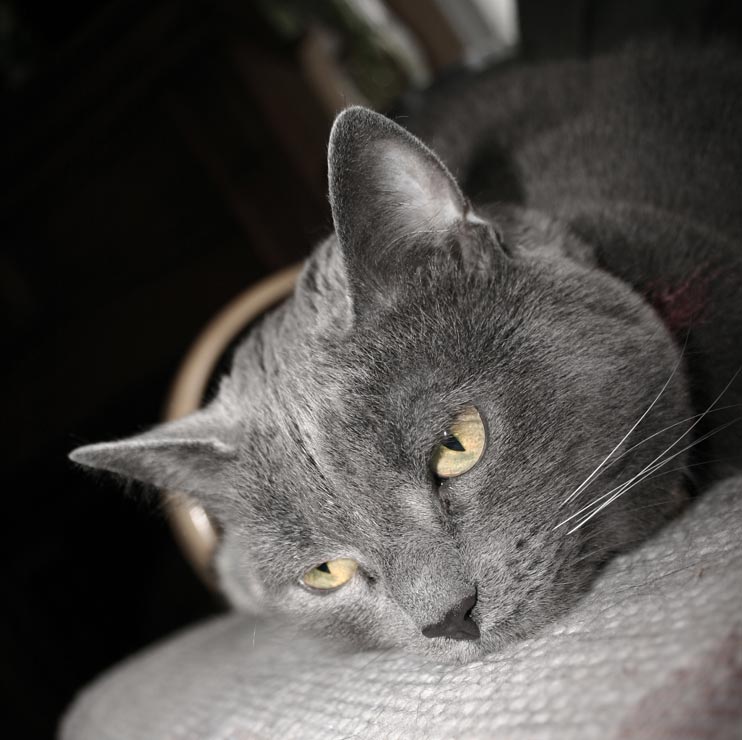Feline Senility: Cognitive Disorder in Cats

If your cat is in her golden years and you are seeing some changes in her behavior, activity, or appetite, don't assume that those changes are just normal aging. Cats often do become a bit more mellow as they age, but most other changes are related to either physical or mental illness. One condition that affects some senior cats is cognitive dysfunction, or senility.
Signs of Senility in Cats
When you see a number of changes in normal behavior patterns occurring together, or present in cats younger than one would expect to see such changes, you need to talk to your veterinarian.
Signs of cognitive disorder are sometimes subtle at first. Usually, if four or more of these signs are evident, the index of suspicion for cognitive disorder is high.
- Vocalization (excessive crying or yowling), particularly at night.
- Pacing, circling, wandering, getting stuck in a corner.
- Change in sleep patterns, confusing days and nights.
- Loss of responsiveness to known people—far-off, staring look.
- Change in appetite.
- Lethargy.
- Forgetting where the litter box is or how to use it, resulting in house-soiling.
- Personality changes—more irritable, less social.
Other Conditions That May Mimic the Signs of Senility
Because senility is an age-related disease, there are other geriatric conditions that cause cats to show similar signs. Some of the more common of these are:
- Hyperthyroidism
- Arthritis
- Anxiety
- Vision/hearing loss
Diagnosing Cognitive Disorder in Cats
As many cats live a longer life span, more emphasis is being placed on identifying and managing the various old age illnesses that creep up on them. Not all of these conditions are physical. When you take your older cat to the veterinarian because you've noticed one or more of the signs listed above, the doctor will do a complete physical examination. From there, he or she may want to run some or all of the following tests to rule out the presence of a medical condition:
- Blood work can help identify other conditions that are common in older cats, such as hyperthyroidism.
- X-rays may be indicated if your veterinarian suspects arthritis, heart or lung problems, or cancer.
- Urinalysis is important for determining whether your cat has conditions such as a urinary tract infection, kidney disease, or diabetes.
- Other testing, such as ultrasound or MRI, may be required to diagnose certain medical conditions.
There is no specific test for senility, but if medical conditions are ruled out, the veterinarian may have you fill out an extensive behavioral history form. This can help establish whether your cat's pattern of signs fits with feline cognitive disorder.
Treating Feline Cognitive Disorder
Once a medical condition is ruled out, your veterinarian may want to try medication, a supplement, and/or a special diet to help support your cat's brain function.
Selegiline, or Anipryl, is the medication most often used for dementia in cats. It is labeled for use in dogs only, but it is used off-label with success in cats too.
Specially-formulated prescription diets and supplements are available to support brain health in older cats. They contain higher levels of antioxidants, B vitamins, and fatty acids.
Home Care for Senile Cats
There are things you can do to help an older cat that is suffering from dementia at home. Some of these tips are also great for older cats in general or those that suffer from other age-related conditions.
- Try not to rearrange furniture or other items in your home. Keeping things consistent decreases anxiety for older cats, helps those with senility remember routes to food and litter boxes better, and is easier for a cat that may be losing her sight.
- Stick to a feeding routine as much as possible. Knowing what to expect when is helpful to cats suffering from dementia.
- Add more food and water bowls to different areas of your home so it's easier for a cat with dementia to find one, wherever she may be hanging out.
- Provide toys and games that can mentally stimulate your older cat such as treat dispensing toys.
- Consider using Feliway spray or Rescue Remedy to help with any anxiety that your cat may be feeling.
- Provide large, shallow litter boxes in multiple areas of the home so your cat can access them and get into them easily.
- If your cat likes to sleep on beds or high surfaces, place stairs or ramps where possible, so she doesn't have to jump up and down.
- Try to be patient. Your senior cat may wake you up with strange yowling at night, miss the litter box occasionally, vomit hairballs more often, and generally cause a bit more work for you. Try to remember that she isn't doing it on purpose, and do what you can to help her age gracefully.
You May Also Like These Articles:
Cats Snoring: Normal or Abnormal?
Subcutaneous Fluid Therapy: Giving Your Cat Fluids at Home
Pet Insurance: Peace of Mind for Your Cat's Health




